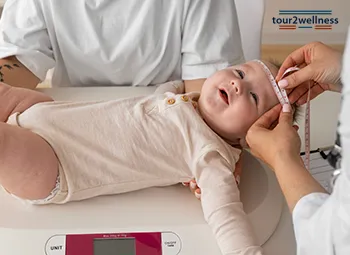
Test tube baby treatment, or In Vitro Fertilization (IVF), triggers big changes in becoming parents. It opens up fresh paths for people and couples to have kids, their dream. Even with victory and approval far and wide, some wrong ideas about the health of IVF babies vs. naturally born babies still stand. This piece aims to knock down these false thoughts. It gives a deep understanding of the health path of IVF babies. It also shines a light on the proof and science behind this whole discussion.
Comparing the Health of BabiesPhysical Development
⦁ Potential Risks Associated with IVF: Although IVF is generally safe, it has
potential risks such as low birth weight and premature birth.
⦁ Long-Term Health Implications: Studies have found that children born due to in
vitro fertilization don't have much different health outcomes in the long run as those
conceived naturally.
Cognitive Development
⦁ Neurological Differences: According to a few studies, some minor differences in
neurological development were suggested between IVF and naturally conceived children.
⦁ ognitive Functioning in IVF Babies: However, cognitive functioning in IVF babies is
typically on par with their naturally conceived counterparts.
⦁ Impact of Parental Factors: Parental factors such as education and socio-economic
status play a significant role in the cognitive development of all children, regardless of
conception method.
Psychological Well-being
⦁ Emotional Resilience: Just as strong emotionally as any other children born naturally are children that have been conceived in vitro.⦁ Bonding with Parents: Strong bonding with parents is crucial for the psychological well-being of IVF babies.
⦁ Mental Health in IVF Babies: Studies have not shown any significant differences in mental health outcomes between IVF and naturally conceived children.

Factors Influencing the Health of IVF Babies
Maternal Age
⦁ Effects of Maternal Age on IVF Conceptions: Maternal age can impact the success of
IVF treatments and the health of resulting babies.
⦁ Risks for Older Mothers: Advanced maternal age is associated with higher risks
during pregnancy and childbirth.
⦁ Importance of Preconception Care: Preconception care plays a vital role in ensuring
the health of both mother and baby during IVF treatments.
Genetic Factors
⦁ Genetic Screening in IVF: Genetic screening helps identify potential genetic
disorders in embryos before implantation.
⦁ Risk of Genetic Disorders:IVF babies have a slightly higher risk of certain genetic
disorders, but the chances are still low.
⦁ Counseling for Couples: Genetic counseling is essential for couples undergoing IVF
to understand potential risks and make informed decisions.
Lifestyle Choices
⦁ Impact of Lifestyle on Fertility: Lifestyle factors such as diet, exercise, and
smoking can influence the success of IVF treatments.
⦁ Preconception Health Recommendations: Health professionals provide guidance on
lifestyle changes that can improve the chances of a successful IVF pregnancy.
⦁ Role of Health Professionals in IVF Care: Healthcare providers play a crucial role
in supporting couples throughout the IVF process.
Multiple Births
⦁ Risks Associated with Multiple Pregnancies: Multiple pregnancies from IVF have
higher risks of complications for both the babies and the mother.
⦁ Strategies to Reduce Multiple Births: Advancements in IVF procedures have helped
reduce the incidence of multiple births.
⦁ Importance of Individualized Care: Individualized care plans are essential to
address the specific needs of each IVF patient.
Preterm Birth
⦁ Preterm Birth Rates in IVF Babies: IVF babies have a slightly higher risk of
preterm birth compared to naturally conceived children.
⦁ Preventative Measures for Preterm Labor: Early monitoring and interventions can help
reduce the risk of preterm labor in IVF pregnancies.
⦁ Neonatal Care for Preterm Babies: For the well-being of preterm babies born through
IVF, it becomes mandatory to provide them with specialized neonatal care.
Long-Term Health Monitoring
⦁ Follow-Up Care for IVF Babies: Regular health check-ups are crucial for monitoring
the long-term health of IVF babies.
⦁ Importance of Regular Health Check-ups: Parents and healthcare providers should
stay
vigilant in monitoring the growth and development of IVF children.
⦁ Support for Families with IVF Children: Families with IVF babies might gain from
extra help. They might need more information to handle possible health issues.
To sum it up, babies from IVF treatments typically have health that's just as good as kids conceived naturally. It's key to toss aside false notions and offer the right facts for folks or couples eyeing IVF as their road to parenthood. By grasping what affects the wellbeing of IVF babies and tackling usual worries, we can skip the false beliefs and welcome the truth of effective IVF treatments.